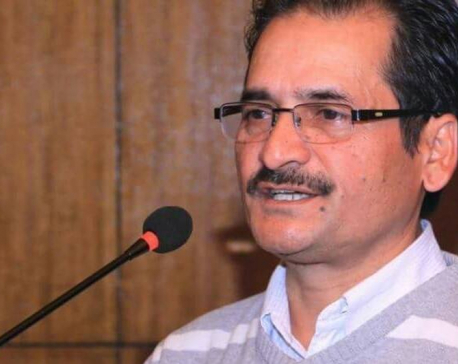
OR
Candidacy of CEC’s relative
Nepal’s electoral laws are liberal. They allow any Nepali citizen of certain age to contest election, irrespective of their beliefs and backgrounds. So CPN (Maoist Center) was on the right side of law when it nominated Pramila Kumari as a provincial assembly candidate under the PR category. She has been fielded under the ‘Madhesi’ quota. It cannot be a coincidence that she just happens to be the daughter-in-law of Chief Election Commissioner Ayodhee Prasad Yadav. It was the Maoist party that had recommended Yadav as chief commissioner back in 2015. When he was appointed, Yadav seemed determined to back his political masters. So when the Pushpa Kamal Dahal-led government announced local elections back in February, Yadav, as chief commissioner, inexplicably delayed imposition of election code of conduct by a week. In this time, the government made countless transfers of CDOs and senior police officials, with a clear intent of influencing the elections. The commission under Yadav also turned the other way when senior ministers were openly violating election code. This is why the latest disclosure in Republica that his daughter-in-law is contesting provincial elections as a Maoist candidate is troubling. There is a clear conflict of interest here.
The fact that Yadav wanted to hide his daughter-in-law’s candidacy is clear from Republica’s conversations with other commission officials who said they too were kept in the dark until recently. If Yadav had nothing to hide, he should have been bold enough to disclose Kumari’s candidacy. Why try to hide something that was bound to come out sooner or later? The chain of events since the declaration of local elections in February also strongly suggest a conflict of interest: it is hard not to arrive at the conclusion that Yadav’s daughter-in-law got to run on Maoist ticket as a quid pro quo for all the undue advantages Yadav has given to the Maoist party in the three-tier elections. As a way of explanation, Yadav says that since his son’s family has already separated from him, election candidacy is their ‘personal choice’. That is true. But the chief commissioner also made a highly unethical personal choice by not disclosing Kumari’s candidacy. How can we expect free and fair elections when the main person tasked with holding them has such brazen conflict of interest and one which he, moreover, seemed determined to hide?
The Election Commission and its chief commissioner must be congratulated for the way they were able to hold the local elections and then the first phase of the joint federal and provincial elections, against great odds: ballots had to be printed apace at the last-minute and election security was rather fragile. But we would also not be off the mark to say that compared to his predecessors like Bhojraj Pokharel (responsible for first CA elections) and Neel Kantha Uprety (responsible for the second), both of whom were widely hailed for their ability to stand above the political fray, the way Yadav has handled the sacred duty of holding democratic elections leaves a lot to be desired. He will struggle to salvage his legacy from this point. Our democratic parties should also remember that in the process of politicizing this all-important constitutional body they are doing irreparable damage to the sanctity of the Nepali electoral process, and to the democratic system at large.
You May Like This

CABTM Nepal launches new ride-sharing app with various features
KATHMANDU, Sept 12: CABTM Nepal Pvt Ltd has launched a new ride-sharing app, CABTM, which operates in three major cities:... Read More...

7 goals in 6 games for Saint's bargain striker Austin
LONDON, Oct 17: As the goals have dried up for Jamie Vardy at Leicester, another former non-league striker has embarked... Read More...

'CIAA revived cantonment case to bargain'
KATHMANDU, Sept 21: CPN (Moist Center) Headquarters Member Mani Thapa has claimed that the Commission for the Investigation of Abuse... Read More...




Just In
- MoHP cautions docs working in govt hospitals not to work in private ones
- Over 400,000 tourists visited Mustang by road last year
- 19 hydropower projects to be showcased at investment summit
- Global oil and gold prices surge as Israel retaliates against Iran
- Sajha Yatayat cancels CEO appointment process for lack of candidates
- Govt padlocks Nepal Scouts’ property illegally occupied by NC lawmaker Deepak Khadka
- FWEAN meets with President Paudel to solicit support for women entrepreneurship
- Koshi provincial assembly passes resolution motion calling for special session by majority votes







_20220508065243.jpg)






Leave A Comment